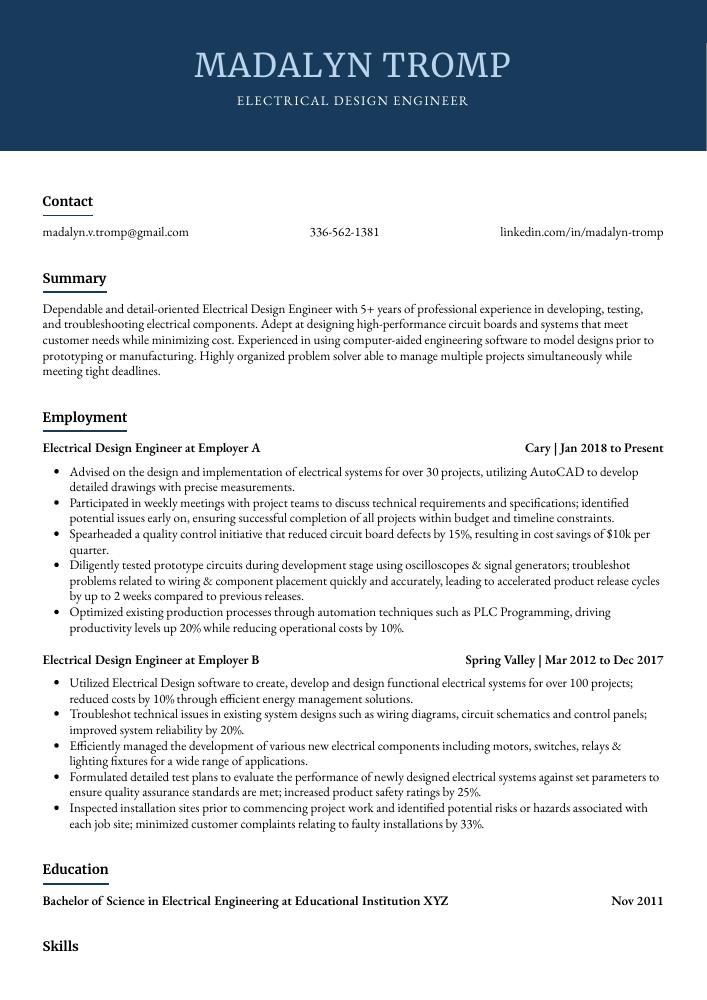Electrical Design Engineer Resume Guide
Electrical Design Engineers design and develop electrical systems, components, and products for various applications. They use their knowledge of engineering principles to create cost-effective solutions that meet customer requirements while adhering to safety standards. Additionally, they may be responsible for the testing and troubleshooting of designs during development or after production.
You have an excellent understanding of electrical engineering principles, and you could help any company reach its objectives. To prove your worth to potential employers, you must craft a resume that accurately reflects your skills and experiences.
This guide will walk you through the entire process of creating a top-notch resume. We first show you a complete example and then break down what each resume section should look like.
Table of Contents
The guide is divided into sections for your convenience. You can read it from beginning to end or use the table of contents below to jump to a specific part.
Electrical Design Engineer Resume Sample
Madalyn Tromp
Electrical Design Engineer
[email protected]
336-562-1381
linkedin.com/in/madalyn-tromp
Summary
Dependable and detail-oriented Electrical Design Engineer with 5+ years of professional experience in developing, testing, and troubleshooting electrical components. Adept at designing high-performance circuit boards and systems that meet customer needs while minimizing cost. Experienced in using computer-aided engineering software to model designs prior to prototyping or manufacturing. Highly organized problem solver able to manage multiple projects simultaneously while meeting tight deadlines.
Experience
Electrical Design Engineer, Employer A
Cary, Jan 2018 – Present
- Advised on the design and implementation of electrical systems for over 30 projects, utilizing AutoCAD to develop detailed drawings with precise measurements.
- Participated in weekly meetings with project teams to discuss technical requirements and specifications; identified potential issues early on, ensuring successful completion of all projects within budget and timeline constraints.
- Spearheaded a quality control initiative that reduced circuit board defects by 15%, resulting in cost savings of $10k per quarter.
- Diligently tested prototype circuits during development stage using oscilloscopes & signal generators; troubleshot problems related to wiring & component placement quickly and accurately, leading to accelerated product release cycles by up to 2 weeks compared to previous releases.
- Optimized existing production processes through automation techniques such as PLC Programming, driving productivity levels up 20% while reducing operational costs by 10%.
Electrical Design Engineer, Employer B
Spring Valley, Mar 2012 – Dec 2017
- Utilized Electrical Design software to create, develop and design functional electrical systems for over 100 projects; reduced costs by 10% through efficient energy management solutions.
- Troubleshot technical issues in existing system designs such as wiring diagrams, circuit schematics and control panels; improved system reliability by 20%.
- Efficiently managed the development of various new electrical components including motors, switches, relays & lighting fixtures for a wide range of applications.
- Formulated detailed test plans to evaluate the performance of newly designed electrical systems against set parameters to ensure quality assurance standards are met; increased product safety ratings by 25%.
- Inspected installation sites prior to commencing project work and identified potential risks or hazards associated with each job site; minimized customer complaints relating to faulty installations by 33%.
Skills
- Electrical Engineering
- Engineering
- AutoCAD
- MATLAB
- Electronics
- Electrical Design
- Electricians
- Manufacturing
- Project Engineering
Education
Bachelor of Science in Electrical Engineering
Educational Institution XYZ
Nov 2011
Certifications
Certified Electrical Design Engineer
Institute of Electrical and Electronics Engineers (
May 2017
1. Summary / Objective
Your resume summary should be a concise and compelling overview of your electrical design engineering experience. Include the most relevant skills, certifications, and accomplishments that make you stand out from other applicants. For example, mention any awards or recognition you have received for your work in this field as well as the number of years’ experience designing complex electrical systems. You could also include details about how you successfully reduced costs on projects or improved efficiency through automation.
Below are some resume summary examples:
Energetic and experienced electrical design engineer with 10+ years of experience in the automation and electronics industry. Proven track record for designing, developing, and testing complex systems for small to large-scale projects. Skilled at working with various programming languages, frameworks, and tech stacks to create innovative solutions that meet customer needs efficiently. Passionate about creating safe and reliable products through engineering excellence.
Diligent electrical design engineer with 8+ years of experience in designing and developing electrical systems for industrial applications. Skilled at 3D modelling, circuit simulations, PCB layout designs, testing protocols and troubleshooting. Proven track record of successful projects that have enabled clients to achieve their business goals on time and within budget. Passionate about creating efficient solutions that are reliable, cost-effective and safe.
Accomplished electrical design engineer with 10+ years of experience in product development and device testing. Seeking to apply hands-on expertise at ABC Corp, where I can use my knowledge of schematic capture, PCB layout, firmware programming, and technical documentation to develop innovative electrical products. Achieved a 30% reduction in component costs for Company XYZ’s new line of medical devices by making strategic upgrades to the existing designs.
Seasoned electrical design engineer with a Master’s degree in engineering and 8+ years of experience designing complex electronics systems for the automotive industry. At XYZ Motors, designed electrical components that reduced energy consumption by 20%, improved product reliability by 40%, and increased output speed by 30%. Seeking to join ABC Motors as an Electrical Design Engineer to create efficient solutions for their next-generation products.
Hard-working electrical design engineer with 8+ years of experience in the semiconductor industry. Proven ability to develop designs for printed circuit boards and other electrical components, as well as troubleshoot existing systems. Experienced in using CAD software such as Altium Designer and EagleCAD. Seeking to join ABC Tech to use my expertise towards creating innovative solutions that will benefit their customers worldwide.
Committed electrical design engineer with 8+ years of experience in PCB circuit and layout design. Proven track record of developing high-performance electrical systems for consumer, industrial, and medical applications. Adept at working with cross-functional teams to identify customer needs then leveraging them into successful product designs that meet exact specifications while adhering to industry standards.
Detail-oriented electrical design engineer with 5+ years of experience designing, developing and testing electrical systems for a variety of applications. Proven track record in meeting deadlines while ensuring product quality and client satisfaction. Seeking to bring my expertise in circuit board layout and system integration to ABC Technologies as the next Electrical Design Engineer.
Driven electrical design engineer with 5+ years of experience creating electrical designs for a variety of products. Seeking to apply expertise in schematic capture and PCB layout development at ABC Tech. Achieved 95% on-time project completion rate and increased performance by 24%. Recognized for developing an automated testing system that reduced debugging time by 73%.
2. Experience / Employment
In the experience section, you should provide details on your employment history. This section is usually written in reverse chronological order, meaning that the most recent job is listed first.
Stick to bullet points when describing what you did; this makes it easier for the reader to take in all of the information quickly and easily. You want to make sure that each point provides detail about what you did and any results or accomplishments achieved as a result of your work.
For example, instead of saying “Designed electrical systems,” you could say, “Developed electrical schematics for multiple projects using AutoCAD software resulting in improved efficiency by 10%.”
To write effective bullet points, begin with a strong verb or adverb. Industry specific verbs to use are:
- Designed
- Analyzed
- Programmed
- Simulated
- Fabricated
- Installed
- Troubleshot
- Tested
- Debugged
- Documented
- Calibrated
- Optimized
- Commissioned
- Assembled
- Inspected
Other general verbs you can use are:
- Achieved
- Advised
- Assessed
- Compiled
- Coordinated
- Demonstrated
- Developed
- Expedited
- Facilitated
- Formulated
- Improved
- Introduced
- Mentored
- Participated
- Prepared
- Presented
- Reduced
- Reorganized
- Represented
- Revised
- Spearheaded
- Streamlined
- Structured
- Utilized
Below are some example bullet points:
- Represented clients in designing electrical systems for over 30 project sites, saving $5,000 in installation costs and reducing construction time by 4 weeks.
- Simulated various circuit designs to test their performance under different conditions; identified and corrected errors that improved the accuracy of the simulations by 15%.
- Programmed PLCs (Programmable Logic Controllers) using ladder logic to control motors & machines on automated production lines with maximum efficiency; increased output by 25% within 2 months of implementation.
- Thoroughly tested every component used before integration into larger circuits, resulting in a 0% failure rate during final system testing phase across all projects handled this year.
- Prepared detailed technical reports outlining all design specifications and modifications made throughout development process for each project site.
- Reliably assembled and installed electrical panels, wire harnesses, switch boxes and other components for 10+ industrial projects; achieved overall completion within budget by 8%.
- Designed innovative wiring diagrams to be used in complex automation systems that increased efficiency by 20% while reducing energy costs by $5K annually.
- Successfully implemented high-level engineering strategies to test the functionality of circuitry systems before deployment; reduced debugging time from 2 hours to 45 minutes on average.
- Utilized AutoCAD software & hardware tools such as voltmeters and oscilloscopes to design custom electrical control boards compliant with industry standards and regulations; decreased development cost per project by 25%.
- Ensured continual maintenance of all existing equipment through regular inspections, repairs & replacements whenever necessary; extended the lifespan of machinery parts an additional 3 years on average.
- Developed over 40 electrical designs for new/existing systems including power distribution, control panels and instrumentation boards; reduced design time by 15% on average.
- Analyzed test results from prototypes of the electrical components to ensure maximum efficiency and safety standards were met before installation in production sites across 5 countries.
- Reduced costs for component procurement through targeted sourcing strategies which resulted in an overall savings of $12,000 over a period of 6 months.
- Actively collaborated with cross-functional teams such as Mechanical Engineers, Project Managers and Architects to review project plans & timelines throughout all stages of product development cycles from concept ideation to delivery completion.
- Presented final engineering solutions at internal meetings alongside detailed technical documentation that enabled better decision making within the organization’s leadership team.
- Introduced innovative design and engineering techniques that led to the completion of 5 electrical projects within budget and ahead of schedule, reducing costs by 8%.
- Facilitated regular meetings with clients and project teams to ensure successful outcomes; successfully met all requirements for each project delivered.
- Reorganized existing systems into more efficient designs, resulting in a 25% increase in productivity over 2 years compared to previous models.
- Compiled detailed reports outlining potential problems with operational systems or proposed solutions for new installations; organized up-to-date technical documentation on all active projects.
- Competently identified cost savings opportunities through improved supply chain management practices, leading to a reduction of expenses totaling $8,000 per month across 4 departments.
- Commissioned and calibrated over 50 electrical equipment and systems, ensuring that all safety regulations were met; reduced installation time by 15%.
- Revised existing designs of various electrical components such as motors, transformers and switchgear to meet customer specifications while maintaining cost-efficiency; improved accuracy by 10% in the last quarter.
- Consistently monitored production processes and troubleshot any malfunctions or breakdowns promptly without disrupting output schedules.
- Improved overall design quality with innovative solutions for optimal performance on complex projects within tight deadlines; exceeded design goals by 7%.
- Developed comprehensive reports detailing progress updates on new engineering initiatives along with recommendations for improvements based on feedback from stakeholders & clients alike.
- Effectively designed and developed electrical systems for commercial, industrial and residential projects, resulting in over 20% cost savings for clients.
- Coordinated with other engineering teams to ensure successful integration of all components into the overall system architecture; completed five projects ahead of schedule last year.
- Demonstrated a high level of proficiency in applying complex theories and principles to design robust circuits that satisfied customer requirements while meeting strict safety regulations.
- Tested finished designs using computer-aided simulation software such as AutoCAD Electrical & PSpice; reduced time spent on debugging by an average of 30%.
- Fabricated prototypes from basic schematics based on project specifications, utilizing various hand tools and equipment including soldering irons and multimeters; successfully created six prototype models within budget last month alone.
- Assessed and designed electrical systems for commercial and residential buildings, resulting in a 15% reduction in energy consumption.
- Mentored junior engineers on the development of electrical system drawings, achieving an average accuracy rate of 98%.
- Meticulously inspected wiring arrangements to ensure compliance with safety regulations and building codes; identified potential hazards before they occurred and managed corrective action promptly.
- Streamlined design processes using CAD software to generate over 100 schematics per month for various projects; increased workflow efficiency by 20%.
- Expedited completion timeframes by coordinating closely with contractors throughout installation process; completed 3 large-scale projects ahead of schedule within budget constraints.
- Debugged electrical circuits and systems, resolving 100+ faults in high-voltage wiring over a 4 month period; improved machine operations by 38%.
- Successfully designed 10+ electrical control panels for industrial machines that complied with industry standards and international safety regulations.
- Structured detailed diagrams of all new designs to ensure smooth installation processes while saving 3 hours on each project due to increased efficiency.
- Documented design parameters and specifications for every prototype created; reduced system errors by 25% through accurate record keeping procedures.
3. Skills
Even though two organizations are hiring for the same role, the skillset they want an ideal candidate to possess could differ significantly. For instance, one may be on the lookout for an individual with experience in designing electrical systems for automotive applications, while the other may be looking for someone with expertise in power system analysis.
Therefore, it is important to tailor the skills section of your resume to each job you are applying for. This will help ensure that applicant tracking systems (computer programs used by employers to scan resumes) pick up on relevant keywords and pass your application along to a human recruiter or hiring manager.
You should also elaborate on some of these skills further down in other sections such as summary or work experience.
Below is a list of common skills & terms:
- AutoCAD
- Automation
- Building Services
- C
- C++
- CAD
- Commissioning
- Computer Aided Design
- Control Systems Design
- Electrical Design
- Electrical Engineering
- Electrical Wiring
- Electricians
- Electronics
- Embedded Systems
- Energy
- Engineering
- Engineering Management
- Instrumentation
- Java
- LabVIEW
- MATLAB
- Manufacturing
- Microcontrollers
- PCB Design
- PLC
- PSpice
- Power Distribution
- Power Electronics
- Power Generation
- Power Systems
- Product Development
- Programming
- Project Engineering
- Project Planning
- Renewable Energy
- Revit
- SCADA
- SOLIDWORKS
- Simulations
- Simulink
- Team Leadership
- Teamwork
- Testing
- Time Management
- Troubleshooting
- Windows
4. Education
Adding an education section to your resume will depend on how far along you are in your career. If you just graduated and don’t have any professional experience, include the education section below your resume objective. However, if you have a few years of relevant work experience to showcase, it might be best to omit an education section altogether.
If including an education section is necessary, mention courses or subjects related to electrical design engineering that demonstrate knowledge applicable for the job role.
Bachelor of Science in Electrical Engineering
Educational Institution XYZ
Nov 2011
5. Certifications
Certifications are a great way to demonstrate your proficiency in a certain field and can give you an edge over other applicants. It shows that you have gone the extra mile to prove your expertise and are willing to invest time into learning new skills.
Including certifications on your resume is beneficial as it gives potential employers evidence of your knowledge and abilities, which could be just what they need when making their hiring decisions.
Certified Electrical Design Engineer
Institute of Electrical and Electronics Engineers (
May 2017
6. Contact Info
Your name should be the first thing a reader sees when viewing your resume, so ensure its positioning is prominent. Your phone number should be written in the most commonly used format in your country/city/state, and your email address should be professional.
You can also choose to include a link to your LinkedIn profile, personal website, or other online platforms relevant to your industry.
Finally, name your resume file appropriately to help hiring managers; for Madalyn Tromp, this would be Madalyn-Tromp-resume.pdf or Madalyn-Tromp-resume.docx.
7. Cover Letter
A cover letter is a great way to make yourself stand out from the crowd of job applicants. It’s an opportunity to explain why you’re perfect for the role and gives recruiters insight into your professional background, qualifications, and personality.
Cover letters should be kept concise but still contain all relevant information about who you are and what you have to offer as a potential employee. Generally speaking they consist of 2-4 paragraphs that complement your resume without repeating it verbatim.
Below is an example cover letter:
Dear Frederic,
I am writing to apply for the position of Electrical Design Engineer at XYZ Corporation. As a highly skilled and experienced electrical engineer, I am confident that I would be an excellent addition to your team.
Through my previous experience working as an electrical engineer, I have gained extensive knowledge in designing and developing electrical systems. In addition, I have also gained strong project management skills which would enable me to successfully oversee the development of electrical projects from start to finish. My ability to work effectively both independently and as part of a team makes me an ideal candidate for this role.
Furthermore, I possess excellent communication skills which would allow me to effectively communicate with other members of the engineering team, as well as with clients. My strong problem-solving abilities would also be beneficial in resolving any issues that may arise during the course of a project.
I believe that my skills and experience make me ideally suited for the position of Electrical Design Engineer at XYZ Corporation. I look forward to discussing my application further with you at your earliest convenience. Thank you for your time and consideration.
Sincerely,
Madalyn
Electrical Design Engineer Resume Templates
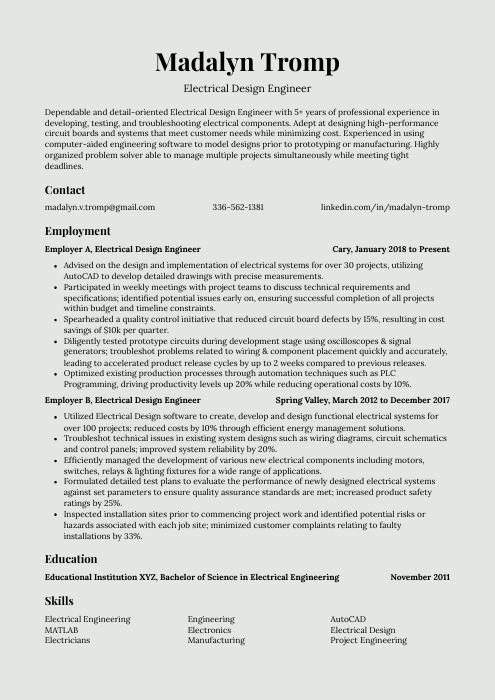 Saola
Saola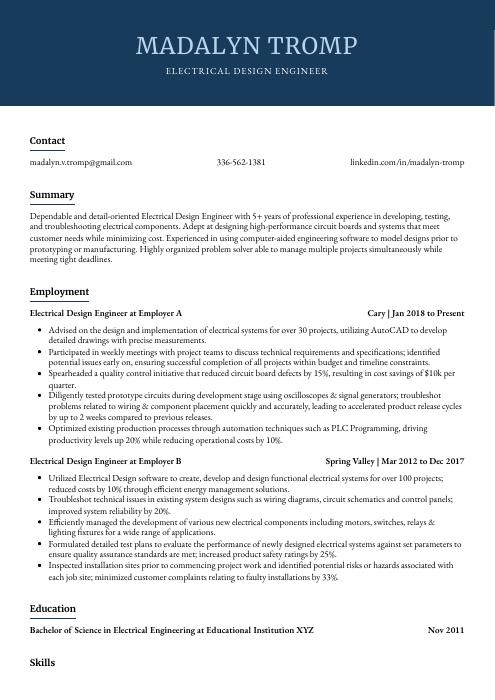 Bonobo
Bonobo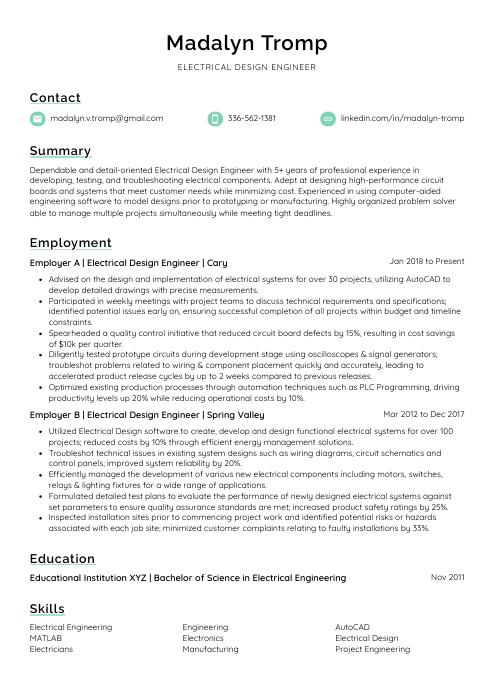 Lorikeet
Lorikeet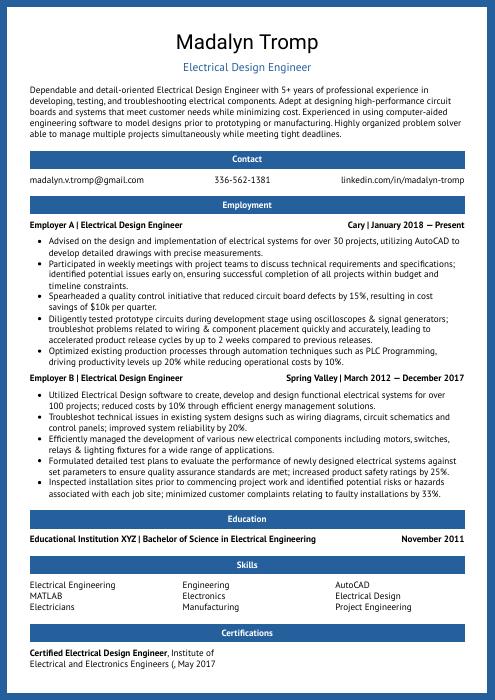 Ocelot
Ocelot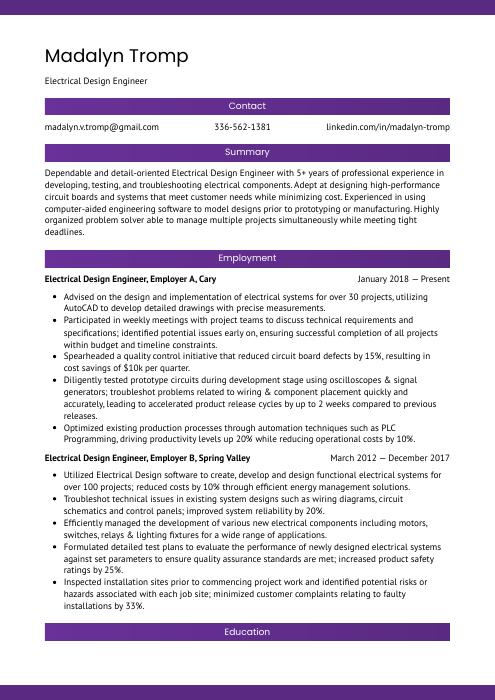 Jerboa
Jerboa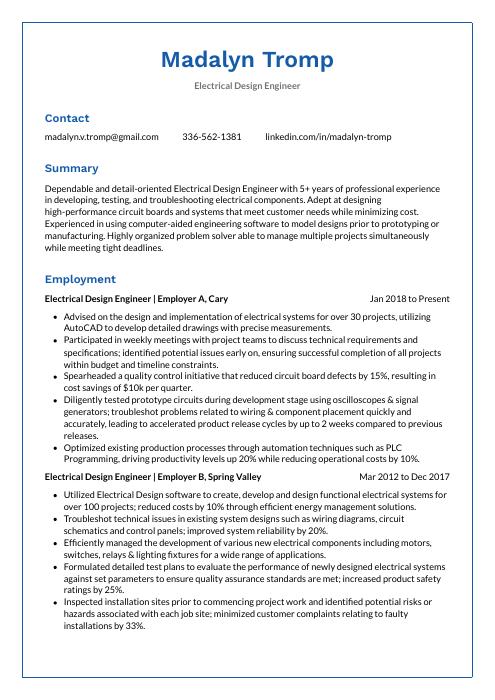 Markhor
Markhor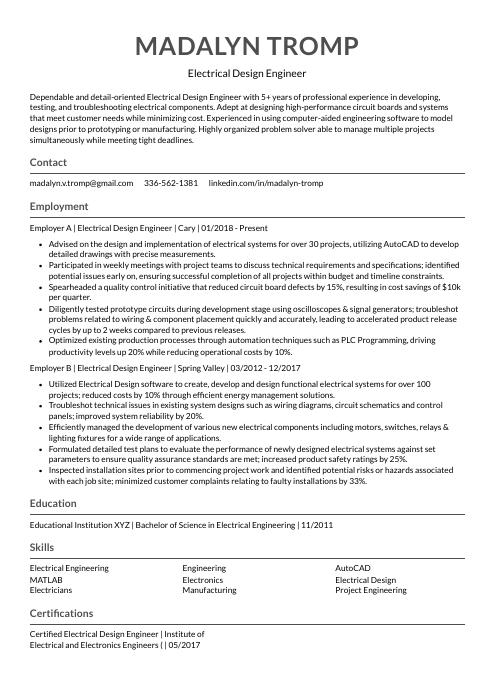 Indri
Indri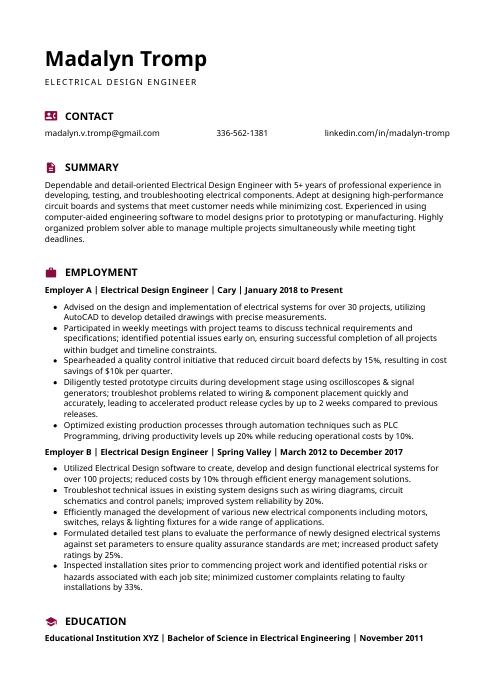 Hoopoe
Hoopoe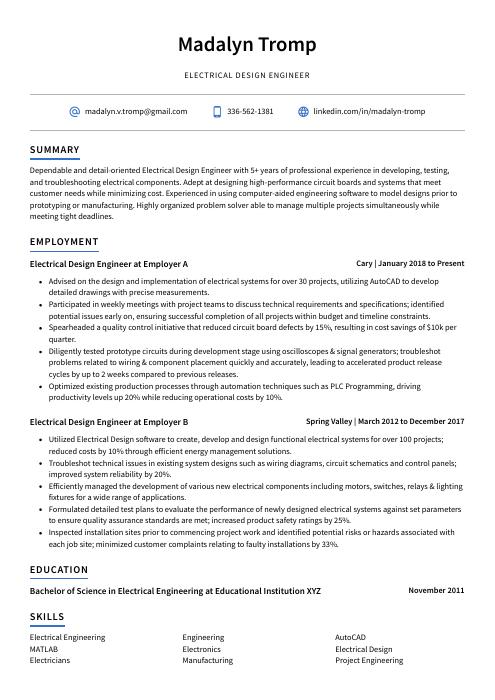 Axolotl
Axolotl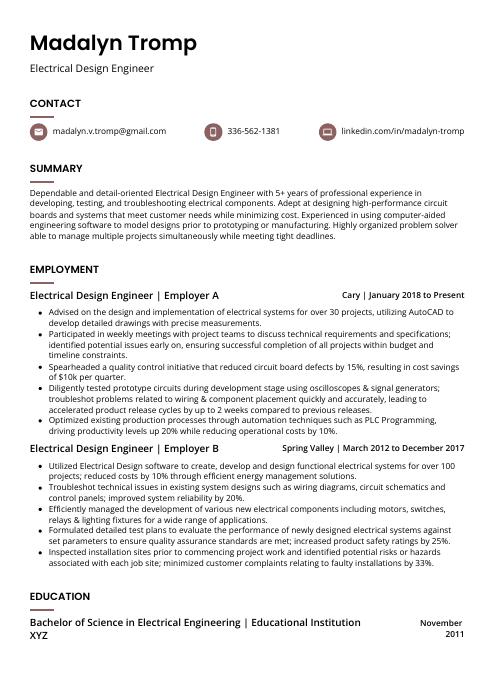 Fossa
Fossa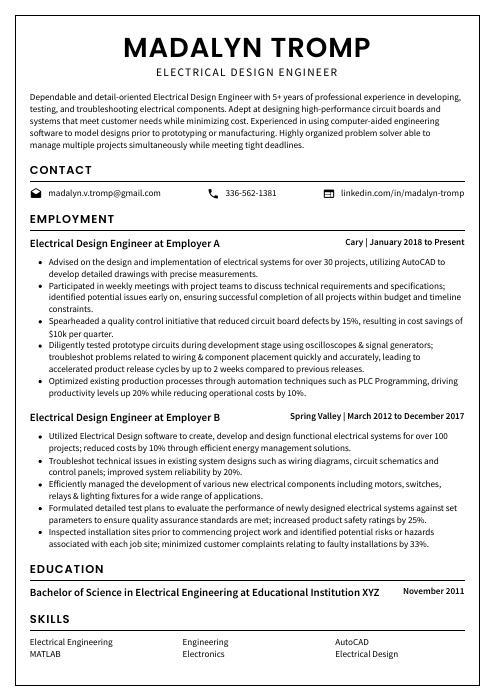 Cormorant
Cormorant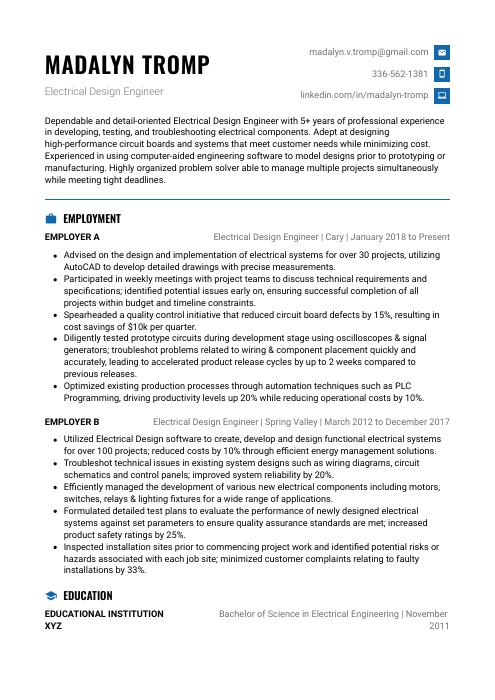 Echidna
Echidna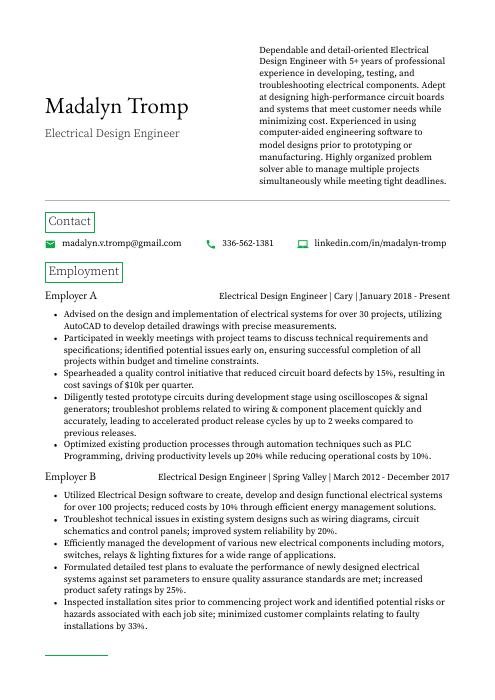 Quokka
Quokka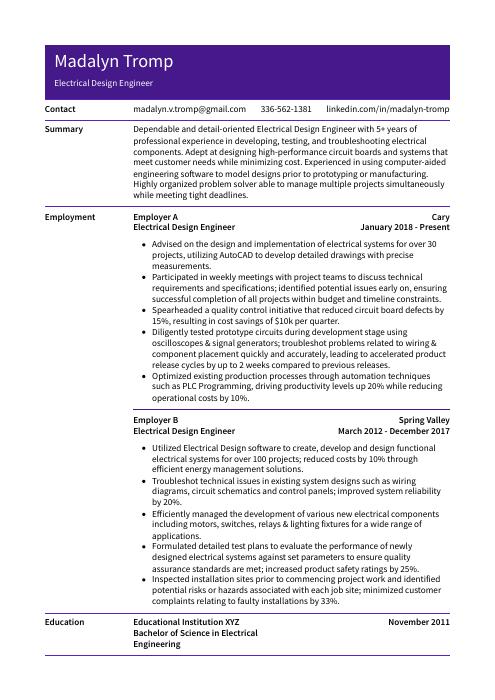 Pika
Pika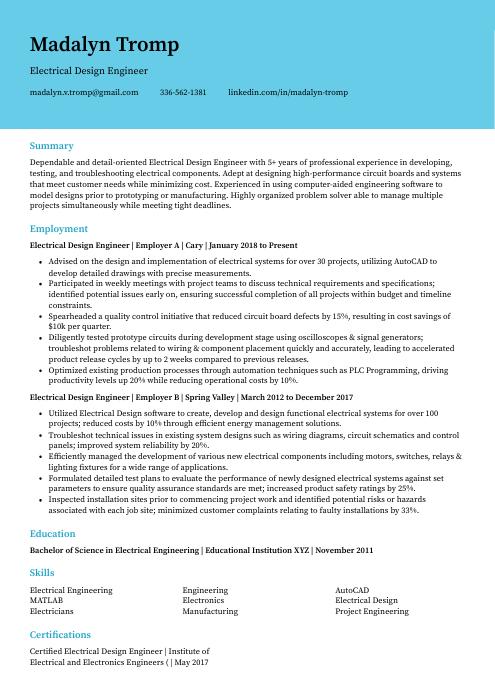 Dugong
Dugong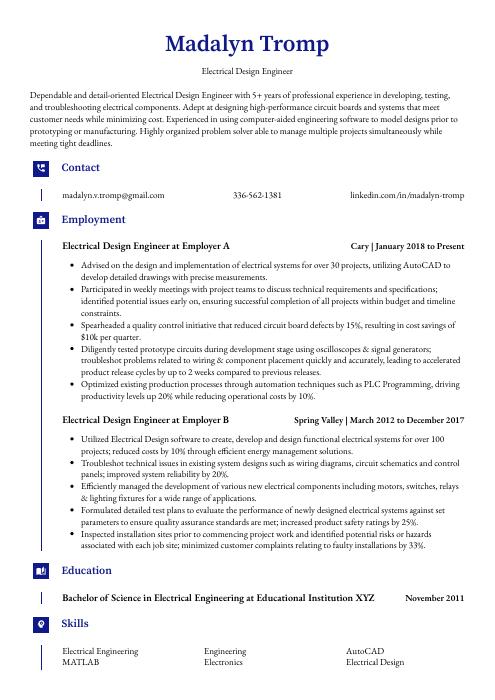 Gharial
Gharial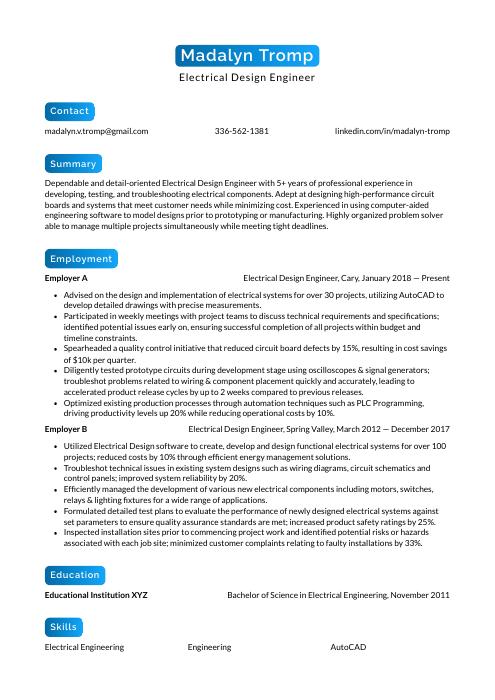 Kinkajou
Kinkajou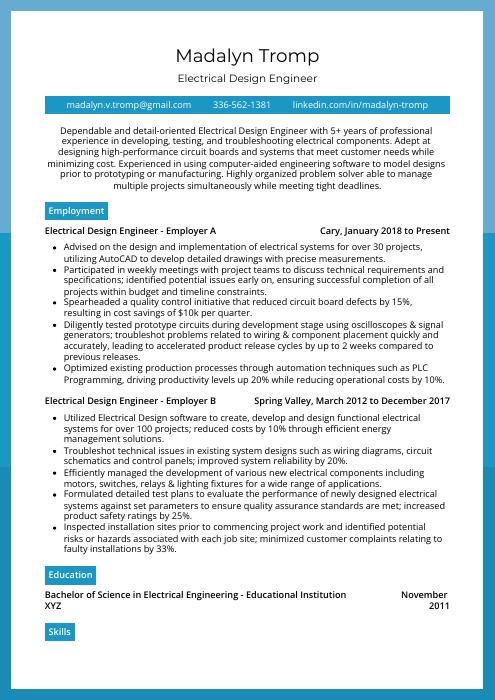 Rhea
Rhea Rezjumei
Rezjumei
